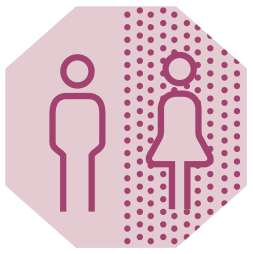
What is Campaign for Justice?
The Campaign for Justice for Muslim Family Laws (CFJ) is one of Musawah’s programme hubs. CFJ’s mission is to accelerate action towards a world where Muslim family laws, procedures and practices recognise and grant women full equality and autonomy in the family. Fair and equitable access to justice in formal and informal court systems and promote “family” in all its diverse forms as a compassionate and secure space.
Why a Campaign for Justice in Muslim Family Laws?
Because Muslim women and girls are severely discriminated against
 Over 45 countries in the world—some with Muslim-majority populations and some with Muslim minorities—have codified or uncodified Muslim family laws that govern family relationships. Many of these laws are discriminatory towards women and girls.
Over 45 countries in the world—some with Muslim-majority populations and some with Muslim minorities—have codified or uncodified Muslim family laws that govern family relationships. Many of these laws are discriminatory towards women and girls.
These de facto and de jure Muslim family laws are the source of discrimination against women, at entry into marriage, during marriage, and at the time of dissolution of marriage.
Inequality and discrimination in the family affect women and girls in all spheres of life especially in key decision making pertaining to education, employment, livelihood, travel, sexual and reproductive health, financial rights, community and political participation etc.
For women and girls there can be no equality in society without equality in the family.
لأن هناك مقاومة ضد إصلاح قوانين الأسرة
Several arguments are commonly used to resist family law reform in Muslim contexts; these are often based on religious grounds. They argue that these laws are ‘God-given’ and any attempt to change such laws goes against Islam.
Many of those in authority claim that men are the protectors and providers of their families and thus men have rights and privileges in Muslim family laws that women do not enjoy. They regard this as complementarity of rights, not inequality.
Over the past decades, scholarship and activism in the Muslim world have developed to make the case for the possibility and necessity of reform. Growing evidence shows that many provisions in Muslim family laws, as defined by classical jurists and as reproduced in modern legal codes, are untenable in contemporary circumstances nor defensible on Islamic grounds.
Not only do these family laws fail to fulfill the Shari’ah requirements of justice, but they are being used to deny women rights and dignified choices in life. These elements lie at the root of marital disharmony and the breakdown of the family.
Religion, ideology, culture or tradition can no longer be used to justify discrimination against women and girls.
Because we believe in the collective power of Muslim women in mobilising a global movement to reform Muslim family laws.
Muslim women have played a critical role in developing feminist scholarship on Islam and in organising and advocating for change within their own communities and countries. There is rich knowledge about activism, advocacy and strategies from within the Muslim world. The sharing of successful advocacy strategies and lessons learnt in overcoming challenges, among women’s rights activists in different countries and regions will strengthen our community and national-level movements.
At the international level there is increasing recognition that egalitarian family laws are essential to achieve gender equality. In compliance with CEDAW, governments have the primary responsibility:
- إشراك النساء المسلمات ركن لا يمكن الإخلال به في حال أردنا إصلاح القوانين والسياسات التي تؤثر على حياتنا؛
- to enact reforms that better comply with treaty obligations which uphold and advance human rights for everyone regardless of religious belief;
- to end discrimination against women in marriage and family and to promote gender equality in families in substantive ways that reflect the needs and realities of today’s families.